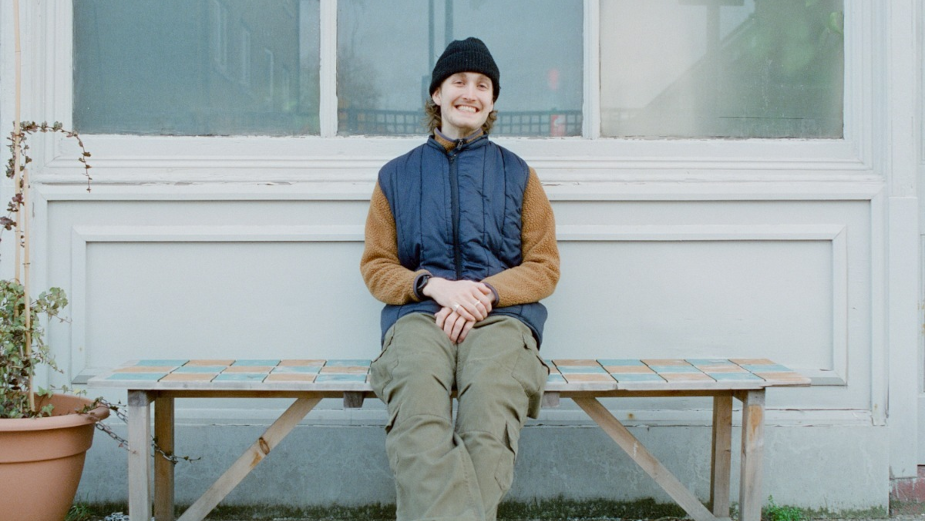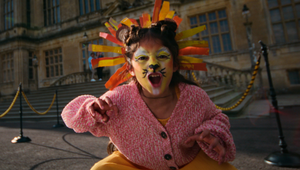
The Directors: Louis Bryant

Louis Bryant is a hands-on social-first director. Cutting his teeth across a variety of genres, he's found his footing in playful set builds and big character performances. He’s an energetic creative, looking for opportunities to combine beauty with comedic curiosity.
Name: Louis Bryant
Location: London, UK
Repped by/in: Pavilion Works
Awards: My mum’s favourite director
LBB> What elements of a script sets one apart from the other and what sort of scripts get you excited to shoot them?
Louis> I love looking for opportunities to push the audience's expectations in the opposite direction to the narrative. Gentle shock that gets read as surprise.
Scripts that give space to rely on camera technique are really fun. My background is in self-shooting, so I love getting to be a bit hands-on, and tie camera movement to narrative.
It’s definitely the zeitgeist at the moment, but seeing characters that set themselves as outsiders is always fun. Getting to play with personalities that carry quirk, and unusual responses are great. I’ve never felt totally like the people around me, so channelling what’s familiar through weirdos is great.
I think it’s special when a script carries space for self-awareness. It’s not always clearly laid out, but recognising the opportunity, and getting to push for self-reflection is so much fun. I love making people recognise the unusual in themselves through my work.
LBB> How do you approach creating a treatment for a spot?
Louis> My gut is usually pretty quick to respond to a brief. I’ll have a few ideas, and in putting them down on a Google Slide doc; fleshing them out some more, I’ll hone in on the one that’s best to carry the narrative. I used to feel bad spending so much time going down rabbit-holes on Vimeo and YouTube, but as soon as a brief comes in, I find my mind’s held all the useful bits as references, and they’ll just leak out to defend a concept. It’s quite reassuring knowing that my mind’s on my side.
LBB> If the script is for a brand that you're not familiar with/ don’t have a big affinity with or a market you're new to, how important is it for you to do research and understand that strategic and contextual side of the ad? If it’s important to you, how do you do it?
Louis> Watch everything! See what they’ve put out previously, on socials, on their website, in interviews, how they interact with influencers/celebs, and how the world talks about them. It’s all a conversion - How do we want to respond? Do we want to leap off an earlier point made, are we trying to drive something home, or are we looking to celebrate a response?
Making people feel known, and eliciting a response in audiences is the best form of connection. With that in mind, looking at how a brand is positioned and how people communicate with them is great at finding tone. Audiences will tell you if something works or doesn’t, so keep your eyes on how they see you in the world.
LBB> For you, what is the most important working relationship for a director to have with another person in making an ad? And why?
Louis> Having a solid EP to sense check you along the way is a Godsend. Someone to be objective when you end up too close to a project, but then to also be your hypeman when you’re in the weeds.
Clooooosely followed, is a good relationship with creatives. Mutual recognition of what’s being brought to the table, allowing space for trust, and judgement free questioning. There’s a lot of people in this game, and lots have egos. A safe space to ask questions, try new things, and be yourself must be fought for and protected.
LBB> What type of work are you most passionate about - is there a particular genre or subject matter or style you are most drawn to?
Louis> Following the trend here, but loving the self-aware, weird-angle, quirky character stuff that’s coming out right now. Getting to tell stories that make people celebrate their idiosyncrasies is great. We’re all strange - nice we can celebrate it now.
LBB> What misconception about you or your work do you most often encounter and why is it wrong?
Louis> I feel newer directors often miss out on opportunities because their portfolios don’t match the references clients have in their mind. I think instead of looking at how creatively their work compares, their work should be logistically considered too. For example comparing the size of teams they’ve worked with, the turnaround time from brief to conception, if they’ve worked with a client or agency multiple times. I think these are good signifiers of work ethic, presence on set, and problem solving. It would be great to see some more creative risks taken with this in mind.
I often hear agencies looking for ‘social-first directors’ or see them send out briefs with smaller budgets to meet the social demand, but are reluctant to let these go to smaller directors. They’re asking the same established names to work on projects they’d be compromising on rather than providing an opportunity to someone up-and-coming, with
potentially more experience creating for social. It’s the classic letting their portfolio do the talking, rather than looking at the quality of their treatment, or logistically similar projects in their portfolio. It’d be nice for a middle-ground to be met.
LBB> What’s the craziest problem you’ve come across in the course of a production – and how did you solve it?
Louis> Needing a covid test 48 before a shoot while on a remote Scottish Island. Helicopter crews, catamarans, and private detectives couldn’t make it happen. But the local boat taxi managed to sort it by shuttling the test over to Glasgow using the canals.
LBB> How do you strike the balance between being open/collaborative with the agency and brand client while also protecting the idea?
Louis> Communication! No one celebrates the brand like the client, so making sure they feel heard is key. I recognise my job to translate those needs best for film, honestly and carefully, is how we all feel heard. We all want to make the best piece of work, placing this first makes sure we work towards the same goal without getting caught up.
LBB> What are your thoughts on opening up the production world to a more diverse pool of talent? Are you open to mentoring and apprenticeships on set?
Louis> Of course! I can give all the excuses I want, but in reality I’ve let this slip once. Going on a white, male dominated set felt heavy. There wasn’t grace. It’s precious being in a space with mutual respect, celebrating perspective and skill. I am totally open, and will do more to make sure this happens beyond a positive attitude.
LBB> How do you feel the pandemic is going to influence the way you work into the longer term? Have you picked up new habits that you feel will stick around for a long time?
Louis> I’m quickest to recognise all the virtual meetings as the biggest change, and to be honest I love it. I’m able to get so much more done, and feel there’s greater patience given. They’re easier to attend, which means the urgent ones can happen asap, and the boring ones I can look at my phone during. Win, win!
LBB> Your work is now presented in so many different formats - to what extent do you keep each in mind while you're working (and, equally, to what degree is it possible to do so)?
Louis> I’m part of the YouTube generation, so I have always had other forms of media consumption knocking about the back of my mind. Audience response is the biggest. I’m always thinking about retention, challenge, and pay-off. About when’s best to use that call-back, and if it could survive being consumed without audio on a small screen. You’ve got to think tactically, but that’s part of the game. Audiences are in on it whether you like it or not.
LBB> What’s your relationship with new technology and, if at all, how do you incorporate future-facing tech into your work?
Louis> I think AI’s great, but it’s hard to make something feel authentic or original. Once you recognise it, to me it loses its charm. There’s some incredible things knocking about using POV, 360, macro. In-camera play is what I’m most interested in right now.
LBB> Which pieces of work do you feel really show off what you do best – and why?
Louis> eBay - Modern Magpies
It’s a huge compliment having a client and agency come back wanting to make more together, and even better when they’re looking for new ways to develop an idea. These pieces are a great example of taking a standard demographic recognition, and wanting to target them with a service/opportunity. Instead of holding an audience member’s hand and showing them exactly how eBay is relevant to them, we got to transpose this mechanic into some silly stories, exploring the thrill of the sale using larger than life performances and energetic camera moves. I think it’s also a great example of development with a brand, with being given the space to grow within a repeated opportunity.
Calm - A Letter To My Past Self
Winning the opportunity to honour a service that changes lives on a daily basis, on a personal level and beyond, was incredible. Looking around and seeing a room full of people all with the same goal of making positive change was the best - I had to pinch myself on set. It’s amazing getting to use your skills for good.
Delicate storytelling with a non-actor, recognising when’s best to step back and give space. Working with Ash was really special.
Saucy Buns - Launch
I recognise this to be the job that opened a lot of doors for me. After I’d put the treatment together Pavilion Works took a risk, seeing its potential to flex some muscles I’d been developing, and put any money they were going to make on the project back into it. I loved writing these silly worlds, and my vision being trusted to benefit the client. It’s also a great example of production flexibility, finding ways to get the most out of a location and script by tactically knowing where to dial up production.
Spotify - Find Your Feels
Getting to share spaces with people with real stories to tell is amazing, and selfishly even more so when I’m the one with the opportunity to draw them out. This piece was a great early example of championing unconventional voices, and recognising the best way to share them social-first.










